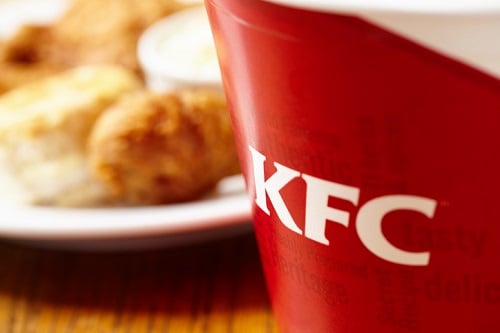

Most supply chain problems don’t prompt a police response, but this week fast food chain KFC has seen its chicken shortage create something of a national crisis.
The fried chicken giant was forced to close hundreds of its 900 UK outlets as a result of a major delivery disruption, which occurred after it switched delivery providers.
On its website, KFC blamed “teething problems” during the move to bring new distributor DHL on board, which replaced its previous contract with specialist food distribution group Bidvest.
According to reports, as many as 646 stores were closed across mainland UK – and a number of police forces have been fielding calls from hungry consumers as a result.
“Please do not contact us about the #KFCCrisis – it is not a police matter if your favourite eatery is not serving the menu that you desire,” Tower Hamlets Police tweeted on Tuesday, with Manchester’s Whitefield force echoing similar sentiments.
The chaos is set to cost the company in more than just reputational harm, with one report suggesting that the delivery meltdown could be costing the fast food chain £1 million a day.
But how are supply chain risks generally insured today, and would KFC be covered? Insurance Business asked Mark Wing, partner at international law firm Clyde & Co.
“Supply chain insurance is a great example of a cover that is still evolving to respond to the increasingly complex and interconnected environment in which businesses operate,” Wing said.
Cover for supply chain risks falls under business interruption insurance, which historically has been limited to interruption flowing from damage to the insured’s own property.
“This meant, however, that an event which does not have a physical effect on the insured’s property – such as DHL’s failure to distribute chicken to KFC’s restaurants – would not give rise to an insured business interruption loss under a standard policy, even if that event had a significant effect on the insured’s business,” Wing explained.
However, with the introduction of contingent business interruption came the provision for limited cover in other types of scenario – for example, the loss of power to the insured’s property. More recently, insurers have begun selling specific supply chain cover, which can be triggered by disruptions in the insured’s supply chain which have a negative impact on the business.
The uptake of such policies is still relatively low, however, according to Wing – who pointed to a 2017 BCI Supply Chain Resilience survey which found that 51% of businesses said their supply chain-related losses were uninsured.
“There are likely to be many reasons for this,” he said. “The relatively recent development of these policies means that some businesses are unaware of their existence. The growing complexity of supply chains, and the fact that no two businesses are alike, means that there is no one-size-fits-all product, and policies are tailored to individual businesses.
“This can result in substantial premiums, which businesses may not be willing to pay and may, instead, prefer to manage their risks through contractual arrangements with their suppliers.”
